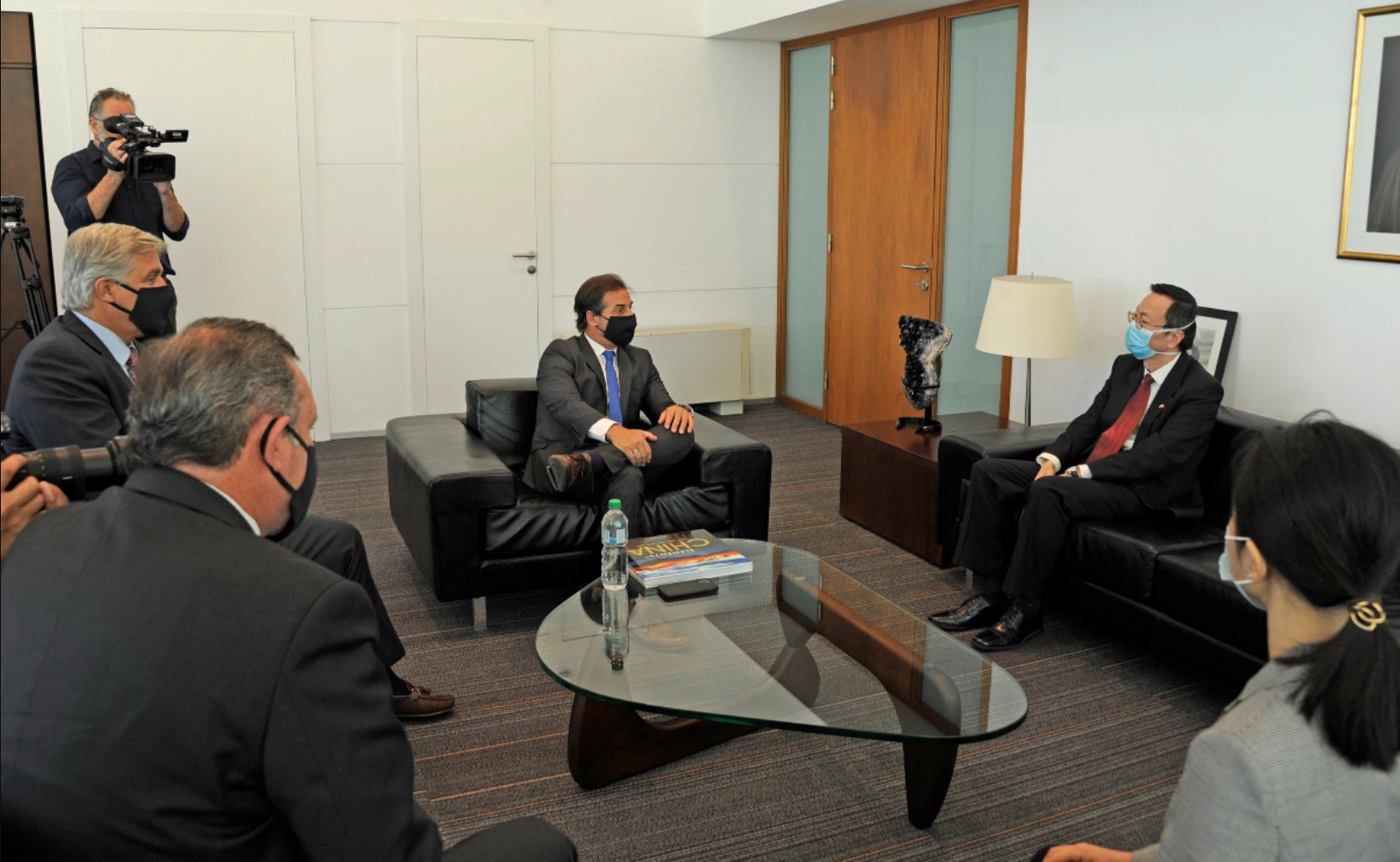During the pandemic, the link between Uruguay and China deepened with full access to Sinovac vaccines that arrived to meet Uruguayan health demands. However, what has attracted national and regional political attention was the announcement by the Uruguayan president that a feasibility study would be initiated to sign a Free Trade Agreement (FTA) between the two countries.
Naturally, such a study does not guarantee the opening of negotiations, but it is considered the first step toward an FTA. Uruguay’s decision and China’s move is one more sign of a growing relationship that generates enormous expectations among national actors.
This is the latest step after the consolidation of the relationship between Uruguay and China with the signing of the Strategic Partnership declaration during President Tabaré Vázquez’s visit to China in 2016. During that voyage, the possibility of advancing in the signing of a bilateral FTA was launched for the first time, which the former Uruguayan president said would happen in 2018.
In the end, the agreement was not reached, mainly due to a lack of leadership in domestic politics, where some national actors blocked the possibility of advancing in the negotiation.
Opposition from Mercosur partners
Uruguay’s ambitions, however, face another major challenge, and that is that so far they have generated controversy in the region due to the different views of Mercosur members. Uruguay argues that it can move forward with the signing of bilateral agreements on the understanding that Decision 32/00 of the Common Market Council is not in force. But this position is not shared by Argentina, which puts the Treaty of Asunción first, a view shared, with less emphasis, by Paraguay.
In the case of Brazil, it should be remembered that, in parallel to the flexibilization proposal led by Uruguay, its interest was fundamentally focused on lowering the common external tariff of the integration scheme. Brazil, especially with the support of the Minister of Economy Guedes and President Bolsonaro, accompanied Uruguay in its proposal and never took a firm position against Uruguay closing an agreement with China, although it did not expressly support it either.
However, with the change of foreign minister in Brazil, Itamaraty Palace once again played a more prominent role, which led to less clear signals from Mercosur’s main partner.
In this context, assuming a change of context -especially in Brazil due to the electoral scenario- Uruguayan representatives should return to negotiations, seeking, for example, the regionalization of the Mercosur’s relations with China, which could be articulated by launching a Mercosur-China dialogue in the next semester, when Uruguay will be in charge of the Mercosur presidency.
Such a signal would be of central importance for China to decide to go ahead with bilateral negotiations. Uruguay’s decision is legitimate if one takes into account that all parties are moving forward with decisions that go against the Treaty of Asunción, an action that has been taking place regularly since 1999 onwards.
On the other hand, while Uruguay established diplomatic relations with China in 1988, a few years after Argentina and Brazil, Paraguay is one of the 14 states in the world that still maintain diplomatic relations with Taiwan. This is yet another stumbling block for Mercosur’s normal relations with the Asian power.
But if Uruguay wants to move forward in this direction, in addition to dealing with its neighbors, it will have to accelerate the negotiation of other agreements proposed by China in areas such as digital and green economy, investments, and cooperation within the Belt and Road Initiative. These would be important signals for China, as they accompany the strategy of achieving a Comprehensive Strategic Partnership, where the signing of the FTA is a very important element, but not the only one.
The road to the FTA-Uruguay
Since 1988, Uruguay’s relationship with China has deepened, not only in terms of exponential growth in trade in goods, which has long made China Uruguay’s largest trading partner, but also in terms of cooperation and political exchanges. Investments, however, have increased but at a slower pace compared to other South American countries.
Since the beginning of the 21st century, China began to take significant steps to become a global player, joining the WTO in 2001, which in a few years catapulted it to become the world’s leading exporter, surpassing Germany. China also began to gain ground in post-war international organizations, a strategy that was complemented by the implementation of new institutions and strategic projects.
In 2001 the Shanghai Cooperation Organization was created, in 2013 China launched the mega project of the Belt and Road, in 2014 it led the launch of the BRICS New Development Bank, in 2016 it did the same with the Asian Infrastructure Investment Bank and in 2020 it managed to sign the RCEP, the trade agreement with the greatest economic and commercial impact globally.
For China, the signing of a trade agreement is one more link in a much wider chain of agreements and signals that result in raising the category of importance that the Chinese Communist Party gives to certain countries. Therefore, in order to reach a Comprehensive Strategic Partnership, a series of long-term actions must be fulfilled -especially in the case of small economies.
In this sense, Uruguay has signed a relevant number of cooperation agreements in different areas, but it has also joined the Belt and Road Initiative, the New Development Bank, and the Asian Infrastructure Investment Bank, which are clear signs of the relevance granted to its main trading partner.
It is clear that Uruguay’s bet is very ambitious, but it is even more possible if the current strategy is partially adjusted since Uruguay’s path toward the FTA with China has already begun and should have no point of return.
Translated from Spanish by Janaína Ruviaro da Silva











